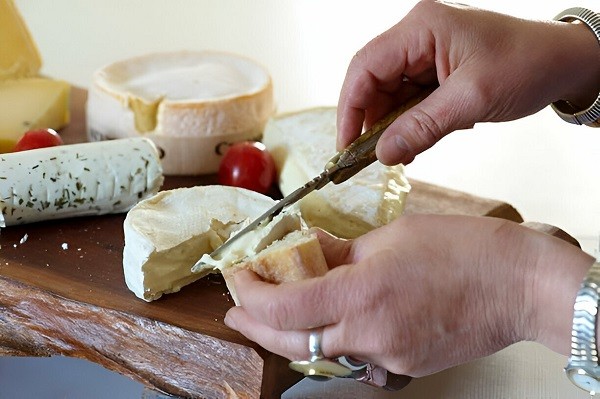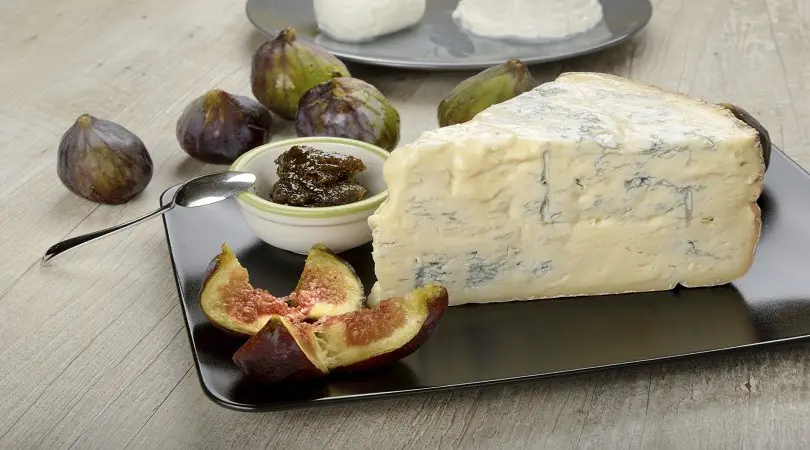Last Updated on January 6, 2025
Yes, you can eat Gorgonzola while pregnant. Here’s a concise and informative answer.
Gorgonzola, a type of blue cheese, is generally safe to eat during pregnancy. It’s made from pasteurized cow’s milk, which minimizes the risk of harmful bacteria such as Listeria. Avoid eating unpasteurized or soft cheeses made from raw milk, as they may contain bacteria that could harm you and your baby.
However, consult with your healthcare provider if you have any concerns or specific dietary restrictions, as each pregnancy is unique. Enjoy Gorgonzola in moderation as part of a balanced diet to satisfy your cravings without compromising your health.

Gorgonzola Cheese And Pregnancy: An Overview
Gorgonzola cheese during pregnancy might pose risks due to potential listeria contamination. It is advisable to consult with a healthcare provider to make an informed decision regarding consuming Gorgonzola cheese while pregnant.
Gorgonzola cheese, with its distinct flavor and creamy texture, can be a tempting choice for many pregnant women. However, when it comes to consuming certain foods during pregnancy, it’s important to consider the potential risks and benefits. In this section, we will explore the topic of eating Gorgonzola cheese while pregnant, focusing on understanding the risks and benefits, exploring the nutritional profile of Gorgonzola, and addressing common concerns among pregnant women.
The Risks And Benefits:
- Gorgonzola cheese is made from unpasteurized milk, which may increase the risk of foodborne illnesses such as listeriosis. Listeriosis can be particularly harmful to pregnant women and their unborn babies.
- The risk of listeriosis is higher in soft and blue-veined cheeses, including Gorgonzola, as they provide a suitable environment for bacteria to grow.
- On the other hand, Gorgonzola cheese is a good source of calcium, protein, and vitamins, which are essential for the healthy development of both the mother and the baby.
Exploring The Nutritional Profile Of Gorgonzola:
- Gorgonzola cheese is rich in calcium, which supports the development of the baby’s bones and teeth. Calcium also plays a vital role in maintaining the mother’s bone health.
- It contains protein, which is crucial for the growth and repair of tissues in both the mother and the baby.
- Gorgonzola cheese also provides essential vitamins such as vitamin A, vitamin D, and vitamin B12, which play important roles in various bodily functions.
Common Concerns Among Pregnant Women:
- The main concern for pregnant women when it comes to Gorgonzola cheese is the risk of listeriosis. It is important to note that the risk is relatively low, but it is still crucial to take precautions.
- To minimize the risk, it is recommended to choose pasteurized Gorgonzola cheese instead of the unpasteurized variety.
- It’s also important to ensure proper storage, refrigeration, and handling of Gorgonzola cheese to prevent the growth of harmful bacteria.
While Gorgonzola cheese can offer nutritional benefits during pregnancy, it is crucial to be aware of the potential risks associated with consuming unpasteurized varieties. It is advisable to consult with a healthcare provider or a nutritionist to make an informed decision about including Gorgonzola cheese in your pregnancy diet.
Remember, the health and safety of both the mother and the baby should always be the top priority.
Is Gorgonzola Safe To Consume During Pregnancy?
Gorgonzola cheese is generally safe to consume during pregnancy if it is made with pasteurized milk. However, it is important to consult with your healthcare provider to ensure it is safe for your specific situation.
Gorgonzola, a type of soft cheese known for its distinctive flavor, is a popular choice for many cheese enthusiasts. However, if you are pregnant, you may be wondering whether it is safe to indulge in this tasty treat. In this section, we will evaluate the safety of consuming Gorgonzola during pregnancy, exploring guidelines and recommendations from experts.
We will also highlight potential risks and precautions to consider.
Evaluating The Safety Of Soft Cheese During Pregnancy:
- Soft cheeses, such as Gorgonzola, are often made with unpasteurized milk, which can contain harmful bacteria such as Listeria.
- Listeria is a foodborne bacteria that can lead to serious health complications for both the mother and the baby, including miscarriage, stillbirth, or preterm labor.
Guidelines And Recommendations From Experts:
- The Centers for Disease Control and Prevention (CDC) advises pregnant women to avoid consuming soft cheeses made with unpasteurized milk.
- While most commercially produced soft cheeses in the United States are made with pasteurized milk, it is essential to check the label to ensure safety.
Potential Risks And Precautions To Consider:
- If you have a strong craving for Gorgonzola or other soft cheeses during pregnancy, opt for varieties made with pasteurized milk.
- Pasteurization is a process that involves heating the milk to kill harmful bacteria, making it safe for consumption.
- Another option is to cook Gorgonzola until it reaches an internal temperature of 165°F (74°C). This can help eliminate any potential bacteria.
It is vital to prioritize your health and the well-being of your unborn child when making food choices during pregnancy. While Gorgonzola can be a delectable addition to your meals, it is crucial to ensure that it is made with pasteurized milk or thoroughly cooked.
By following these guidelines and recommendations, you can enjoy cheese safely while pregnant.

Nutritional Value Of Gorgonzola For Pregnant Women
Gorgonzola can be safely consumed by pregnant women due to its high nutritional value. It is rich in calcium, protein, and vitamins, which are essential for fetal development and overall maternal health. However, it is important to choose pasteurized versions to prevent any risk of foodborne illnesses.
Gorgonzola cheese is a delicious addition to many culinary creations, but if you’re pregnant, you may be wondering if it’s safe to indulge in this creamy delight. Let’s take a closer look at the nutritional value of Gorgonzola and how it can be incorporated into a well-balanced diet during pregnancy.
Examining The Nutrient Content Of Gorgonzola Cheese:
Gorgonzola cheese is a good source of various essential nutrients that can support a healthy pregnancy. Here are some key nutrients found in Gorgonzola:
- Protein: Gorgonzola cheese contains a decent amount of protein, which is essential for the growth and development of your baby.
- Calcium: Calcium is vital for the development of your baby’s bones and teeth. Gorgonzola cheese provides a significant amount of this essential mineral.
- Vitamin B12: Gorgonzola is a rich source of vitamin B12, which plays a crucial role in the formation of red blood cells and the development of your baby’s nervous system.
- Zinc: Zinc is important for the healthy growth and development of your baby. Gorgonzola cheese contains a reasonable amount of this essential mineral.
Essential Vitamins And Minerals For A Healthy Pregnancy:
- Folate: Folate is critical during pregnancy as it helps in the development of your baby’s neural tube. It is recommended to pair Gorgonzola cheese with folate-rich foods such as leafy greens or legumes.
- Iron: Iron is crucial for both you and your baby as it helps carry oxygen to your cells. Combining Gorgonzola cheese with iron-rich foods like lean meats or fortified cereals can enhance your iron intake.
- Vitamin D: Gorgonzola cheese contains a small amount of vitamin D which is vital for the development of your baby’s bones and teeth. However, it’s always a good idea to ensure adequate vitamin D levels through sunlight exposure or fortified foods.
Incorporating Gorgonzola Into A Well-Balanced Diet:
- Moderation is key: Gorgonzola cheese can be enjoyed during pregnancy, but it should be consumed in moderation due to its higher risk of containing listeria bacteria. Ensure that the Gorgonzola you consume is made from pasteurized milk.
- Pairing with healthy choices: To balance out the indulgence, pair Gorgonzola with nutrient-dense foods like fresh fruits, vegetables, whole grains, and lean proteins. This will help create a well-rounded and nourishing meal.
- Cooking heat: If you’re concerned about the risk of listeria, you can choose to cook Gorgonzola cheese in dishes like salads or pastas, as heat kills the bacteria.
Remember, it’s always best to consult with your healthcare provider or a registered dietitian before making any significant dietary changes during pregnancy. They can provide personalized recommendations based on your specific needs.
Gorgonzola’s Protein Content For Pregnancy
Gorgonzola cheese can be consumed during pregnancy due to its high protein content, supporting proper fetal development and overall maternal health.
The Importance Of Protein During Pregnancy
- Protein is an essential nutrient during pregnancy as it plays a crucial role in the growth and development of the baby and supports the overall health of the mother.
- Protein helps in the formation of new cells, tissues, and organs, contributing to the baby’s proper growth.
- It also helps in the production of enzymes and hormones that regulate various functions in the body.
- Adequate protein intake during pregnancy can help prevent conditions like pre-eclampsia and gestational diabetes.
How Gorgonzola Can Contribute To Meeting Protein Needs
- Gorgonzola, a delicious Italian blue cheese, can be a valuable source of protein in a pregnant woman’s diet.
- It contains approximately 20-25 grams of protein per 100 grams, making it a protein-rich option.
- Including Gorgonzola in your meals can help meet your daily protein requirements while providing a flavorful addition to your diet.
- Its creamy texture and distinct taste also make it a versatile ingredient that can be incorporated into various dishes.
Choosing The Right Portion Size
- While Gorgonzola can be a nutritious addition to a pregnant woman’s diet, portion control is important.
- It is recommended to consume Gorgonzola in moderation due to its high fat content.
- Stick to appropriate portion sizes, such as one ounce (28 grams) per serving.
- Pair it with other nutrient-rich foods like fruits, vegetables, whole grains, and lean proteins for a balanced meal.
- Always consult with your healthcare provider or a registered dietitian to determine the right portion sizes based on your specific nutritional needs during pregnancy.
By emphasizing the importance of protein during pregnancy, explaining how Gorgonzola can help meet those needs, and highlighting the significance of portion control, you can make informed decisions about including Gorgonzola in your diet while pregnant. Remember to consult with your healthcare provider for personalized advice.
Enjoy the flavorful benefits of Gorgonzola while nourishing yourself and your growing baby.
Gorgonzola’S Calcium Content For Strong Bones And Teeth
Gorgonzola cheese is rich in calcium, making it a great option for maintaining strong bones and teeth. However, it is important to consult with a healthcare professional before eating Gorgonzola or any other cheese during pregnancy.
Gorgonzola, known for its distinctive flavor and creamy texture, is one of the many cheeses expecting mothers often wonder about indulging in during pregnancy. Calcium, a vital nutrient for both the mother and the developing baby, plays a crucial role in the formation of strong bones and teeth.
Let’s explore the role of calcium in pregnancy and how Gorgonzola can be a source of this essential mineral.
The Role Of Calcium In Pregnancy:
- Calcium is a mineral that aids in the proper development of the baby’s bones and teeth.
- It is also crucial for the mother’s own bone health during the transformative stages of pregnancy.
- Adequate calcium intake can help prevent conditions like preeclampsia and osteoporosis.
- Calcium is necessary for the proper functioning of the baby’s heart, nerves, and muscles.
Gorgonzola As A Source Of Calcium:
- Gorgonzola is a cheese made from cow’s milk, and like other dairy products, it contains calcium.
- One ounce of Gorgonzola cheese provides approximately 212 milligrams of calcium, fulfilling around 21% of the daily recommended intake during pregnancy.
- Calcium from Gorgonzola is easily absorbed by the body, making it an efficient source of this essential mineral.
Balancing Calcium Intake With Other Dairy Products:
- While Gorgonzola can contribute to meeting your calcium needs during pregnancy, it is important to maintain a balanced diet.
- Incorporate other dairy products like milk, yogurt, and cheese into your meals to ensure a diverse intake of calcium-rich foods.
- Aim for a total of 1,000 milligrams of calcium per day during pregnancy, adjusting as needed based on your healthcare professional’s advice.
- Choosing low-fat or non-fat dairy options can help control overall calorie and saturated fat intake.
Remember, moderation is key when consuming Gorgonzola or any other type of cheese during pregnancy. Be sure to consult with your doctor or healthcare provider for personalized advice based on your specific needs and medical history.
Gorgonzola’s Vitamin B12 Content For Red Blood Cell Production
Gorgonzola cheese is a great source of Vitamin B12 which contributes to red blood cell production. Pregnant women can safely consume Gorgonzola in moderation to meet their nutritional needs.
Gorgonzola cheese is known for its distinct flavor and creamy texture, but did you know that it can also be a valuable source of vitamin B12? This essential nutrient plays a crucial role in red blood cell production, making it particularly important during pregnancy.
Let’s explore the significance of vitamin B12 during pregnancy and how Gorgonzola can contribute to meeting this nutritional need.
The Significance Of Vitamin B12 During Pregnancy
During pregnancy, the body requires increased levels of certain vitamins and minerals to support the growth and development of the baby. Vitamin B12 is one such nutrient that plays a vital role in the formation of red blood cells. These cells carry oxygen to all parts of the body, supporting the overall health and well-being of both the mother and baby.
Deficiency of vitamin B12 during pregnancy can lead to various complications, including anemia and impaired neurological development in the baby. Therefore, it is crucial to ensure an adequate intake of vitamin B12 during this time.
Gorgonzola As A Vitamin B12 Source
Gorgonzola cheese can be a delicious and convenient way for pregnant women to increase their intake of vitamin B12. Here are some key points to consider:
- Gorgonzola is a type of blue cheese made from cow’s milk that undergoes a unique aging process. This process contributes to the formation of the characteristic blue-green mold veins and imparts a tangy flavor to the cheese.
- Gorgonzola cheese is a natural source of vitamin B12, with approximately 1.34 micrograms per 100 grams. This can contribute significantly to meeting the recommended daily intake of vitamin B12 during pregnancy, which is 2.6 micrograms.
- Including Gorgonzola in your diet can provide a tasty alternative to traditional sources of vitamin B12, such as meat, fish, and eggs. This is especially beneficial for vegetarians or those who have dietary restrictions.
- However, it is important to note that Gorgonzola is a soft cheese and can be made from unpasteurized milk, which may pose a risk of bacterial contamination. To ensure safety during pregnancy, it is advisable to opt for pasteurized Gorgonzola or consult with your healthcare provider regarding specific food safety guidelines.
Alternatives For Those With Dietary Restrictions
While Gorgonzola can be a valuable source of vitamin B12, some individuals may have dietary restrictions that prevent them from consuming this cheese. Here are a few alternatives to consider:
- Fortified foods: Many food products, such as cereals and plant-based milk, are fortified with vitamin B12. Check the labels and choose fortified options to ensure an adequate intake of this essential nutrient.
- Supplements: If it is challenging to meet your vitamin B12 needs through dietary sources alone, your healthcare provider may recommend taking vitamin B12 supplements. These can be an effective way to ensure you are getting the right amount of this nutrient during pregnancy.
- Other dairy products: If you are unable to consume Gorgonzola, there are other dairy products that can provide a good amount of vitamin B12. Examples include milk, yogurt, and hard cheeses like cheddar and Swiss.
Remember, it is always best to consult with your healthcare provider or a registered dietitian for personalized guidance on meeting your nutritional needs during pregnancy. They can provide you with specific recommendations based on your diet and individual requirements.
So, while Gorgonzola can be a tasty option for boosting your vitamin B12 intake, it is essential to consider safety guidelines and explore alternative sources if needed. With the right choices and guidance, you can ensure optimal nutrition for both you and your growing baby during this precious time.
Gorgonzola’s Probiotic Properties For Gut Health
Gorgonzola cheese, with its probiotic properties, can be a safe choice for pregnant women looking to maintain gut health. Its creamy texture and distinct flavor make it a delicious addition to salads, pasta dishes, or even as a dip.
Gorgonzola, known for its distinct flavor and creamy texture, is a type of Italian blue cheese that has gained popularity in the culinary world. While it may seem like an indulgence, gorgonzola actually offers some surprising probiotic benefits for gut health.
In this section, we will explore the probiotic content of gorgonzola and how it can be incorporated into a pregnant woman’s diet.
Benefits Of Probiotics During Pregnancy:
- Probiotics are beneficial bacteria that promote a healthy balance in the gut microbiome, which is especially important during pregnancy.
- Maintaining a healthy gut microbiome can help boost the immune system, reduce the risk of certain infections, and support digestion.
- Probiotics have also been linked to a reduced risk of allergies and eczema in babies.
- Incorporating probiotics into the diet can help alleviate common pregnancy discomforts such as constipation, bloating, and heartburn.
Exploring Gorgonzola’s Probiotic Content:
- Gorgonzola cheese, like other types of blue cheese, is made through a fermentation process involving specific strains of bacteria and fungi.
- This fermentation process gives gorgonzola its characteristic tangy flavor and creamy texture.
- The bacteria involved in the fermentation process, such as Lactobacillus and Bifidobacterium, are known probiotic strains.
- These probiotic strains can help support a healthy gut environment by crowding out harmful bacteria and promoting the growth of beneficial bacteria.
- While the exact probiotic content of gorgonzola may vary, studies have shown that it can contain significant amounts of live probiotic cultures.
Incorporating Other Probiotic-Rich Foods Into The Diet:
- While gorgonzola can be enjoyed in moderation during pregnancy, it’s always beneficial to include a variety of probiotic-rich foods in your diet.
- Some other probiotic-rich foods that can be safely consumed during pregnancy include yogurt, kefir, sauerkraut, kimchi, and miso.
- These foods offer different strains of probiotics, providing a diverse range of beneficial bacteria to support gut health.
- When incorporating probiotic-rich foods into your diet, opt for options with live and active cultures to maximize their probiotic benefits.
- It’s important to note that every pregnancy is different, so it’s always advisable to consult with your healthcare provider before making any significant dietary changes.
Remember, maintaining a healthy gut microbiome during pregnancy can have long-lasting benefits for both you and your baby. By including gorgonzola and other probiotic-rich foods in your diet, you can support your gut health and enjoy the delightful flavors they have to offer.
Potential Risks And Precautions Of Eating Gorgonzola While Pregnant
Gorgonzola cheese poses potential risks during pregnancy due to the possible presence of harmful bacteria. It is advisable to avoid consuming this cheese to reduce the risk of foodborne illnesses. Pregnant women should opt for safer alternatives to ensure a healthy pregnancy.
The Risk Of Listeria Contamination In Soft Cheese
- Listeria is a type of bacteria that can cause food poisoning, especially in pregnant women.
- Soft cheeses, like Gorgonzola, have a higher risk of harboring listeria due to their moisture content and production process.
- Listeria infection during pregnancy can lead to serious complications for both the mother and the baby.
Pasteurization And Its Role In Reducing Risks
- Pasteurization is a heat treatment process that kills harmful bacteria, including listeria, in food products.
- Most commercially produced soft cheeses, including Gorgonzola, are made from pasteurized milk.
- Pasteurization significantly reduces the risk of listeria contamination in Gorgonzola and makes it safer for pregnant women to consume.
Safety Measures For Consuming Gorgonzola During Pregnancy
- Consult with your healthcare provider before including Gorgonzola in your pregnancy diet.
- Ensure that the Gorgonzola you consume is made from pasteurized milk.
- Check the label for information on pasteurization to ensure the cheese is safe.
- Follow good hygiene practices while handling and storing Gorgonzola.
- Be mindful of the overall consumption of soft cheeses during pregnancy and balance it with other nutritious foods.
- If you experience any symptoms of listeria infection, such as fever, muscle aches, or nausea, seek medical attention promptly.
Remember, it’s important to prioritize your health and the health of your baby during pregnancy. While Gorgonzola can be enjoyed safely when made from pasteurized milk, it’s always best to consult with your healthcare provider for personalized advice. By following the mentioned safety measures, you can savor the flavors of Gorgonzola without compromising your well-being.
Identifying High-Quality Gorgonzola Products
Discovering quality Gorgonzola products is important, especially if you’re pregnant and considering consuming it. Learn more about safely enjoying Gorgonzola while expecting.
Gorgonzola, with its rich and creamy texture, is a delicious cheese that many pregnant individuals crave. However, when it comes to enjoying Gorgonzola during pregnancy, it’s crucial to ensure that you are consuming high-quality and safe products. Here are some tips for identifying the best Gorgonzola options:
Reading Labels And Identifying Pasteurized Cheese
- Look for the term “pasteurized” on the cheese label: Pasteurization is a process that eliminates harmful bacteria, such as Listeria, from the cheese. Always choose Gorgonzola that explicitly states its pasteurization status.
- Check for the FDA seal: The Food and Drug Administration (FDA) seal is not mandatory, but it indicates that the cheese has undergone rigorous safety checks and meets the FDA’s quality standards.
- Avoid cheeses labeled as “raw milk” or “unpasteurized”: These cheeses have not gone through the pasteurization process and may contain pathogens that could pose a risk during pregnancy.
Choosing Reputable Brands And Suppliers
- Research reliable brands and suppliers: Opt for well-established and reputable brands known for their high-quality cheese production and strict food safety standards. Reading reviews and seeking recommendations can help you identify trustworthy sources.
- Check for certifications: Look for certifications such as USDA organic or Verified Non-GMO. These certifications indicate that the cheese meets specific quality criteria and has undergone additional testing for purity.
- Consider artisanal options: Artisanal cheese producers often prioritize quality over quantity. They often use traditional methods and source milk from trusted local farmers, resulting in a more controlled and traceable production process.
- Support local and specialty cheese shops: These shops often have a passion for curating a selection of unique and high-quality cheeses. Building a relationship with knowledgeable cheese experts can ensure you get the best recommendations and insights about the Gorgonzola they carry.
Storing Gorgonzola Properly To Maintain Safety
- Keep Gorgonzola refrigerated: Cheese, including Gorgonzola, should always be stored in the refrigerator to maintain its freshness and safety. Avoid leaving it at room temperature for extended periods.
- Follow storage instructions: Different Gorgonzola products may have specific storage requirements. Pay attention to the label’s instructions regarding temperature, packaging, and shelf life.
- Properly wrap and seal: To prevent cross-contamination and preserve the cheese’s quality, wrap the Gorgonzola tightly in plastic wrap or aluminum foil. Consider using airtight containers or resealable bags to provide an extra layer of protection against moisture and odors.
- Use separate storage for different cheeses: If you have multiple types of cheese, it’s best to store them separately. This reduces the risk of flavor and aroma transfer between different cheeses.
By following these guidelines for identifying high-quality Gorgonzola products, you can enjoy this delicious cheese safely during your pregnancy. Remember to always prioritize food safety and consult with your healthcare provider if you have any concerns.
Moderation And Portion Control For Gorgonzola Consumption
Gorgonzola consumption during pregnancy requires moderation and portion control. It is important to be mindful of the amount consumed to ensure a safe and healthy pregnancy.
Gorgonzola is a delicious cheese known for its distinct flavor and creamy texture. If you’re pregnant and wondering whether you can safely enjoy this cheese, the good news is that it can be included in your diet. However, like all things during pregnancy, it’s important to practice moderation and portion control when consuming gorgonzola.
Here are some guidelines to help you incorporate gorgonzola into your meals and snacks while managing potential risks:
Recommended Serving Sizes For Pregnant Women
- Limit your gorgonzola intake to small, occasional servings.
- Stick to the recommended serving size, which is typically 1 to 2 ounces per serving.
- Enjoy gorgonzola as part of a balanced meal or snack instead of consuming it on its own.
- Pair gorgonzola with nutrient-rich foods like fruits, vegetables, and whole grains to create a well-rounded meal or snack.
Incorporating Gorgonzola Into Balanced Meals And Snacks
- Add crumbled gorgonzola to salads for an extra burst of flavor and creaminess.
- Sprinkle gorgonzola over roasted vegetables or baked potatoes to elevate the taste.
- Use gorgonzola as a topping for whole wheat crackers or sliced apples for a satisfying snack.
- Incorporate gorgonzola into a homemade pizza or pasta dish, combining it with other ingredients like veggies and lean protein.
Avoiding Excessive Consumption To Manage Potential Risks
- High consumption of gorgonzola, or any soft cheese, during pregnancy may increase the risk of foodborne illnesses.
- Excessive intake of gorgonzola can potentially expose you to listeria, a bacteria that can harm both you and your baby.
- To reduce the risk of foodborne illnesses, limit your overall intake of soft cheeses, including gorgonzola, and make sure they are properly pasteurized.
- If you have any concerns or questions, it’s always best to consult with your healthcare provider for personalized advice.
By practicing moderation and portion control, you can safely enjoy the unique flavors of gorgonzola while ensuring a healthy pregnancy. Remember to prioritize a balanced diet and listen to your body’s needs throughout this special time.
Alternatives To Gorgonzola During Pregnancy
Pregnant women seeking alternatives to Gorgonzola can opt for similar soft cheeses that are safe to consume, such as Brie, Camembert, or goat cheese. Remember to always check the label and ensure that the cheese is made from pasteurized milk.
Exploring Other Cheese Options For Pregnant Women:
- Mozzarella: This mild and creamy cheese is a popular choice for pregnant women. It is made from pasteurized milk and is generally safe to consume during pregnancy. Mozzarella can be enjoyed in various recipes or as a topping on pizzas and salads.
- Cheddar: Known for its sharp and tangy flavor, cheddar cheese is a versatile option that can be used in cooking, snacking, or melting on sandwiches. Opt for pasteurized cheddar to ensure it is safe for consumption during pregnancy.
- Swiss: This cheese variety is famous for its nutty and slightly sweet taste. Swiss cheese made from pasteurized milk can be a safe option for pregnant women. Enjoy it as a stand-alone snack or melt it on sandwiches and burgers.
- Cottage cheese: Cottage cheese is packed with protein and can make a nutritious addition to a pregnant woman’s diet. Opt for varieties made from pasteurized milk and pair it with fruits, vegetables, or use it as a filling in wraps.
- Cream cheese: Cream cheese is creamy, mild, and delicious, making it a popular choice for bagels, sandwiches, and dips. Look for pasteurized cream cheese to ensure it is safe for consumption during pregnancy.
- Ricotta: This Italian cheese is often used in pasta dishes and desserts. Made from pasteurized milk, ricotta can be a safe and tasty option for pregnant women looking for variety in their diet.
- Feta (in moderation): While many soft cheeses are off-limits during pregnancy, feta can be consumed in moderation. Make sure to choose pasteurized feta and enjoy it sparingly, as it can still carry a slight risk.
- Hard cheeses: Hard cheeses like Parmesan, Gouda, and Gruyere are generally safe for pregnant women. These cheeses undergo a longer aging process, which contributes to their safety. Grate them over pasta dishes or enjoy them on a cheese platter.
Remember to always check the labels and choose cheeses made from pasteurized milk to ensure the safety of yourself and your baby during pregnancy.
Frequently Asked Questions
What Happens If You Accidentally Eat Gorgonzola While Pregnant?
Accidentally eating gorgonzola while pregnant may increase the risk of foodborne illness.
Is Gorgonzola A Pasteurized Cheese?
Yes, gorgonzola cheese is typically made from pasteurized milk to ensure food safety.
Can I Have Cooked Gorgonzola Cheese While Pregnant?
Yes, it is safe to consume cooked gorgonzola cheese while pregnant.
Which Cheese To Avoid When Pregnant?
Avoid soft and unpasteurized cheeses during pregnancy to reduce the risk of harmful bacteria.
Can I Eat Gorgonzola Cheese If I’m Pregnant?
Yes, you can eat gorgonzola cheese while pregnant, but with caution. Ensure it’s pasteurized to avoid any risks.
Conclusion
Gorgonzola cheese, although delicious, may not be safe for consumption during pregnancy due to its potential risk of causing foodborne illnesses. The presence of the bacteria Listeria monocytogenes in unpasteurized Gorgonzola can pose serious health threats to both the mother and the unborn baby.
Pregnant women must prioritize their health and safety by avoiding such high-risk foods. However, it is important to note that not all Gorgonzola cheese is unsafe. Pasteurized Gorgonzola cheese, which is heated to kill harmful bacteria, can be consumed with caution during pregnancy.
It is always advisable to check the label or ask the supplier to ensure that the Gorgonzola cheese you are purchasing is made from pasteurized milk. To further ensure the safety of your and your baby’s health, it is best to consult with your healthcare provider regarding your dietary restrictions during pregnancy.
They can provide you with personalized recommendations and guidance based on your situation. In summation, while Gorgonzola cheese may be tempting, it is better to err on the side of caution and opt for pasteurized alternatives during pregnancy to reduce the risk of any potential harm.











